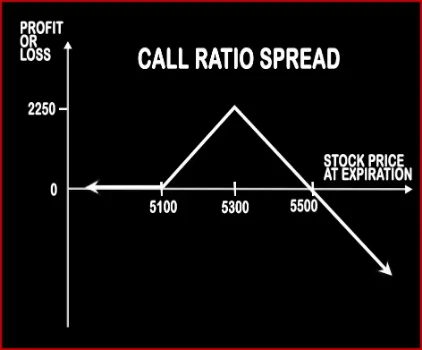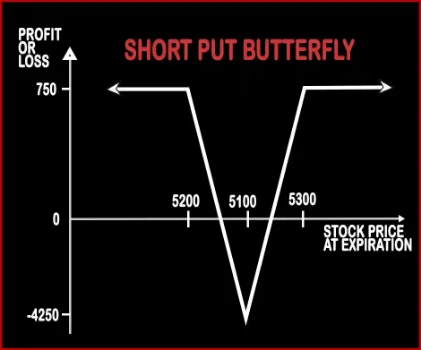Compare Strategies
| RATIO CALL SPREAD | SHORT PUT BUTTERFLY | |
|---|---|---|

|

|
|
| About Strategy |
Ratio Call Spread Option StrategyAs the name suggests, a ratio of 2:1 is followed i.e. buy 1 ITM Call and simultaneously sell OTM Calls double the number of ITM Calls (In this case 2). This strategy is used by trader who is neutral on the market and bearish on the volatility in the near future. Here profits will be capped up to the premium amount and risk will be potentially unlimited since he is |
Short Put Butterfly Option StrategyIn Short Put Butterfly strategy, a trader is neutral in nature and expects the market to remain range bound in the near future. A trader will buy 2 ATM Put Options; sell 1 ITM & 1 OTM Put Options. Here risk and returns both are limited. Risk:< .. |
RATIO CALL SPREAD Vs SHORT PUT BUTTERFLY - Details
| RATIO CALL SPREAD | SHORT PUT BUTTERFLY | |
|---|---|---|
| Market View | Neutral | Neutral |
| Type (CE/PE) | CE (Call Option) | PE (Put Option) |
| Number Of Positions | 3 | 4 |
| Strategy Level | Beginners | Advance |
| Reward Profile | Limited | Limited |
| Risk Profile | Unlimited | Limited |
| Breakeven Point | Upper Breakeven Point = Strike Price of Short Calls + (Points of Maximum Profit / Number of Uncovered Calls), Lower Breakeven Point = Strike Price of Long Call +/- Net Premium Paid or Received | Upper Breakeven Point = Strike Price of Highest Strike Short Put - Net Premium Received, Lower Breakeven Point = Strike Price of Lowest Strike Short Put + Net Premium Received |
RATIO CALL SPREAD Vs SHORT PUT BUTTERFLY - When & How to use ?
| RATIO CALL SPREAD | SHORT PUT BUTTERFLY | |
|---|---|---|
| Market View | Neutral | Neutral |
| When to use? | This strategy is used by trader who is neutral on the market and bearish on the volatility in the near future. Here profits will be capped up to the premium amount and risk will be potentially unlimited since he is selling two calls. | In Short Put Butterfly strategy, a trader is neutral in nature and expects the market to remain range bound in the near future. |
| Action | Buy 1 ITM Call, Sell 2 OTM Calls | Sell 1 ITM Put, Buy 2 ATM Put, Sell 1 OTM Put |
| Breakeven Point | Upper Breakeven Point = Strike Price of Short Calls + (Points of Maximum Profit / Number of Uncovered Calls), Lower Breakeven Point = Strike Price of Long Call +/- Net Premium Paid or Received | Upper Breakeven Point = Strike Price of Highest Strike Short Put - Net Premium Received, Lower Breakeven Point = Strike Price of Lowest Strike Short Put + Net Premium Received |
RATIO CALL SPREAD Vs SHORT PUT BUTTERFLY - Risk & Reward
| RATIO CALL SPREAD | SHORT PUT BUTTERFLY | |
|---|---|---|
| Maximum Profit Scenario | Strike Price of Short Call - Strike Price of Long Call + Net Premium Received - Commissions Paid | Net Premium Received - Commissions Paid |
| Maximum Loss Scenario | Price of Underlying - Strike Price of Short Calls - Max Profit + Commissions Paid | Strike Price of Higher Strike Short Put - Strike Price of Long Put - Net Premium Received + Commissions Paid |
| Risk | Unlimited | Limited |
| Reward | Limited | Limited |
RATIO CALL SPREAD Vs SHORT PUT BUTTERFLY - Strategy Pros & Cons
| RATIO CALL SPREAD | SHORT PUT BUTTERFLY | |
|---|---|---|
| Similar Strategies | Variable Ratio Write | Short Condor, Reverse Iron Condor |
| Disadvantage | • Unlimited potential loss. • Complex strategy with limited profit. | • High risk strategy and may cause huge losses if the price of the underlying stocks falls steeply. • Higher profit is only possible when shares get close to expiration. |
| Advantages | • Downside risk is almost zero. • Investors can book profit from share prices moving within given limits. • Trader can maximise profit when the share closes at the upper breakeven point. | • Benefits from time decay. • Traders can earn more in a rising or range bound scenario. • Benefits from a surge in volatility. |